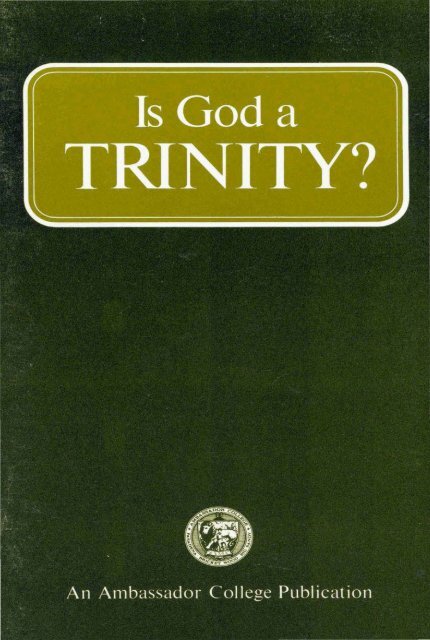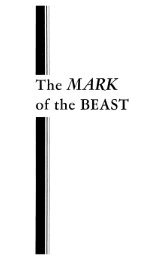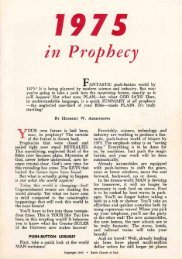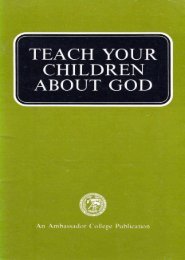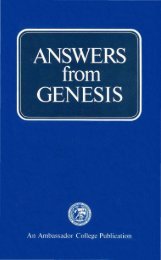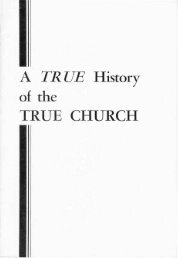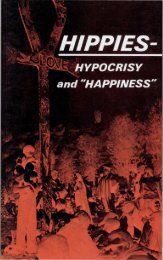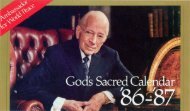Is God A Trinity PDF - Church of God Faithful Flock
Is God A Trinity PDF - Church of God Faithful Flock
Is God A Trinity PDF - Church of God Faithful Flock
Create successful ePaper yourself
Turn your PDF publications into a flip-book with our unique Google optimized e-Paper software.
<strong>Is</strong> <strong>God</strong> aTRINITY?by George L. JohnsonAmbassador College PressPasadena. California
This booklet is not to be sold.It is a free educational service inthe public interest, published byAmbassador College.© '9 73 Ambassador CollageAll Rights ReservedPrinted in U.S.A
<strong>Is</strong> <strong>God</strong> a <strong>Trinity</strong> or a family?Was Jesus Christ <strong>God</strong>, ormerely a man? Was Jesus theborn son <strong>of</strong> <strong>God</strong>, or only anadopted son? <strong>Is</strong> the Holy Spirita person or the creative power<strong>of</strong> the <strong>God</strong>head? These questionsabout the nature <strong>of</strong> <strong>God</strong>are answered in this booklet.
CHAPTER ONE<strong>Is</strong> the<strong>Trinity</strong> Biblical?THE belief that <strong>God</strong> is one substance, yet three persons,is one <strong>of</strong> the central doctrines <strong>of</strong> the Christianreligion. The concept <strong>of</strong> the <strong>Trinity</strong> is believed bymost pr<strong>of</strong>essing Christians, whether Catholic or Protestant.A Gallup Poll taken in 1966 found that 97% <strong>of</strong> theAmerican public believed in <strong>God</strong>. Of that number, 83%believed that <strong>God</strong> is a <strong>Trinity</strong>.Yet for all this belief in the <strong>Trinity</strong>, it is a doctrinethat is not clearly understood by most Christian laymen.In fact, most have neither the desire nor the incentive tounderstand what their church teaches. Few laymen areaware <strong>of</strong> any problems with the doctrine <strong>of</strong> the <strong>Trinity</strong>.They simply take it for granted - leaving the mysteriousdoctrinal aspects to theologians.And if the layman were to investigate further, hewould be confronted with discouraging statements similarto the following: "The mind <strong>of</strong> man cannot fully understandthe mystery <strong>of</strong> the <strong>Trinity</strong>, He who would try tounderstand the mystery fully will lose his mind. But hewho would deny the <strong>Trinity</strong> will lose his soul" (HaroldLindsell and Charles J, Woodbridge, A Hand book <strong>of</strong>Christian Truth, pp, 51-52),Such a statement means that the concept <strong>of</strong> the <strong>Trinity</strong>should be accepted or else. But, merely to accept it asdoctrine without proving it would be totally contrary to
<strong>Is</strong> <strong>God</strong> a <strong>Trinity</strong>?Scripture. <strong>God</strong> inspired Paul to write: "Prove all things;hold fast that which is good" (I Thes. 5:21).Peter further admonished Christians: " .. Be readyalways to give an answer to every man that asketh you areason <strong>of</strong> the hope that is in you ... " (I Peter 3:15).Therefore the Christian is duty bound to provewhether or not <strong>God</strong> is a <strong>Trinity</strong>.Clear Explanation DifficultIf you were to confine yourself to reading the articleson the <strong>Trinity</strong> in popular religious literature for laymen,you would conclude that the <strong>Trinity</strong> is everywhere andclearly taught in the Bible. However, if you were to beginto read what the more technical Bible encyclopedias, dictionariesand books say on the subject, you would come toan entirely different conclusion. And the more you studied,the more you would find that the <strong>Trinity</strong> is built on avery shaky foundation indeed.The problems inherent in clearly explaining the <strong>Trinity</strong>are expressed in nearly every technical article or bookon the subject.The New Catholic Encyclopedia begins: "It is difficult,in the second half <strong>of</strong> the 20th century, to <strong>of</strong>fer a clear,objective, and straightforward account <strong>of</strong> the revelation,doctrinal evolution, and the theological elaboration <strong>of</strong> themystery <strong>of</strong> the <strong>Trinity</strong>. Trinitarian discussion, RomanCatholic as well as other, presents a somewhat unsteadysilhouette" (Vol. XIV, p. 295). (Emphasis ours throughoutbooklet.)But why should the central doctrine <strong>of</strong> the Christianfaith be so difficult to understand? Why should such animportant doctrine present an unsteady silhouette? <strong>Is</strong>n'tthere a clear biblical revelation <strong>of</strong> the doctrine <strong>of</strong> the<strong>Trinity</strong>? Didn't Christ and the apostles plainly teach it?Surely the Bible would be filled with teachings aboutsuch an important subject as the <strong>Trinity</strong>. But, unfortunatelythe word "<strong>Trinity</strong>" never appears in the Bible.'The term '<strong>Trinity</strong>' is not a Biblical tenn, and we arenot using Biblical language when we define what is
<strong>Is</strong> the <strong>Trinity</strong> Biblical?expressed by it as the doctrine" (The International StandardBible Encyclopedia, article "<strong>Trinity</strong>," p. 3012).Not only is the word "<strong>Trinity</strong>" never found in theBible, there is no substantive pro<strong>of</strong> such a doctrine is evenindicated.In a recent book on the <strong>Trinity</strong>, Catholic theologianKarl Rahner recognizes that theologians in the past havebeen " ... embarrassed by the simple fact that in realitythe Scriptures do not explicitly present a doctrine <strong>of</strong> the'imminent' <strong>Trinity</strong> (even John's prologue is no such doctrine)"(The <strong>Trinity</strong>, p. 22). (Author's emphasis.)Other theologians also recognize the fact that the firstchapter <strong>of</strong> John's Gospel- the prologue- clearly showsthe pre-existence and divinity <strong>of</strong> Christ and does not teachthe doctrine <strong>of</strong> the <strong>Trinity</strong>. After discussing John's prologue,Dr. William Newton Clarke writes: ''There is no<strong>Trinity</strong> in this; but there is a distinction in the <strong>God</strong>head, aduality in <strong>God</strong>. This distinction or duality is used as basisfor the idea <strong>of</strong> an only-begotten Son, and as key to thepossibility <strong>of</strong> an incarnation" (Outline <strong>of</strong> Christian Theology,p. 167).The first chapter <strong>of</strong> John's Gospel clearly shows thepre-existence <strong>of</strong> Christ. It also illustrates the duality <strong>of</strong><strong>God</strong>. And as Dr. Clarke points out, the key to the possibility<strong>of</strong> the incarnation- the fact that <strong>God</strong> could becomeman.The Apostle John makes plain the unmistakable factthat Jesus Christ is <strong>God</strong> (John 1:1-4). Yet we find no<strong>Trinity</strong> discussed in this chapter.More Biblical "Pro<strong>of</strong>" for the <strong>Trinity</strong>?Probably the most notorious scripture used in timespast as "pro<strong>of</strong>" <strong>of</strong> a <strong>Trinity</strong> is I John 5:7. However, manytheologians recognize that this scripture was added to theNew Testament manuscripts probably as late as theeighth century AD.Notice what Jamieson, Fausset and Brown wrote intheir commentary: "The only Greek MSS. [manuscripts],in any form which support the words, 'in heaven, theFather, the Word, and the Holy Ghost: and these three are
10 <strong>Is</strong> <strong>God</strong> a <strong>Trinity</strong>?one. And there are three that bear witness in earth . .' arethe Mont{ortianus <strong>of</strong> Dublin, copied evidently from themodern Latin Vulgate; the Rauianus copied from theComplutensian Polyglot; a MS. [manuscript] at Naples,with the words added in the margin by a recent hand;Ottobonianus, 298, <strong>of</strong> the fifteenth century, the Greek <strong>of</strong>which is a mere translation <strong>of</strong> the accompanying Latin.All old versions omit the words."The conclusions arrived at in their commentary, writtenover 100 years ago, are still valid today. More conservativelyoriented The New Bible Commentary(Revised) agrees, though "quietly" with Jamieson, Faussetand Brown. " ... The words are clearly a gloss and arerightly excluded by RSV [Revised Standard Version] evenfrom its margin" (p. 1269).The editors <strong>of</strong> Peake's Commentary on the Bible waxmore eloquent in their belief that the words are not part <strong>of</strong>the original text. "The famous interpolation after 'threewitnesses' is not printed even in RSV, and rightly. It citesthe heavenly testimony <strong>of</strong> the Father, the logos, and theHoly Spirit, but is never used in the early trinitariancontroversies. No respectable Greek MS contains it.Appearing first in a late 4th century Latin text, it enteredthe Vulgate and finally the NT [New Testament] <strong>of</strong>Erasmus" (p. 1038).Scholars clearly recognize that I John 5:7 is not part<strong>of</strong> the New Testament text. Yet it is still included by somefundamentalists as biblical pro<strong>of</strong> for the <strong>Trinity</strong> doctrine.Even the majority <strong>of</strong> the more recent New Testamenttranslations do not contain the above words. They are notfound in M<strong>of</strong>fatt, Phillips, the Revised Standard Version,Williams, or The Living Bible (a paraphrase).It is clear, then, that these words are not part <strong>of</strong> theinspired canon, but rather were added by a "recent hand."The two verses in I John should read: "For there are threethat bear record, the Spirit, and the water and the blood:and these three agree in one."Three things bear record. But what do they bearrecord to? A <strong>Trinity</strong>? We shall see.
<strong>Is</strong> the <strong>Trinity</strong> Biblical?Bear Record to What?The Spirit, the water and the blood bear record <strong>of</strong> thefact that Jesus Christ, the Son <strong>of</strong> <strong>God</strong>, is living His lifeover again in us. John clarifies it in verses 11-12:"And this is the record, that <strong>God</strong> hath given to useternal life, and this life is in his Son. He that hath the Sonhath life; and he that hath not the Son <strong>of</strong> <strong>God</strong> hath notlife."But how do these three elements - the Spirit, thewater, and the blood - specifically bear witness to thisbasic biblical truth?"The Spirit beareth witness with our spirit, that weare the children <strong>of</strong> <strong>God</strong>" (Rom. 8:16). (We will see moreabout the part the Spirit plays in Chapter Three.)Water is representative <strong>of</strong> baptism, which bears witness<strong>of</strong> the burial <strong>of</strong> the old self and the beginning <strong>of</strong> a newlife (Rom. 6:1-6).The blood represents Christ's death by crucifixion,which pays the penalty for our sins, reconciling us to <strong>God</strong>(Rom. 5:9, 10).Now understand why Christ commanded the apostlesto baptize in the name <strong>of</strong> the Father, the Son and the HolySpirit (Matt. 28:19). First <strong>of</strong> all, Jesus did not commandthe apostles to baptize in the name <strong>of</strong> the Father, the Sonand the Spirit as an indication that <strong>God</strong> is a <strong>Trinity</strong>. Nosuch relationship is indicated in the Bible.Why, then, were they to baptize using these threenames? The answer is clear.They were to baptize in the name <strong>of</strong> the Fatherbecause it is the goodness <strong>of</strong> <strong>God</strong> that brings us to repentance(Rom. 2:4), and because the Father is the One "<strong>of</strong>whom the whole family in heaven and earth is named"(Eph. 3:15). In the name <strong>of</strong> the Son because He is the onewho died for our sins, and in the name <strong>of</strong> the Spiritbecause <strong>God</strong> sends His Spirit, making us His begottenSons (Rom. 8:16).Many theologians have misunderstood the part thatthe Father, the Son and the Holy Spirit play in each(Continued on page 15)
1rlh~lFli~Lt~~cclhri~Ltli©\illlll1flllffilllc©.\1fll@.ml 9The central doctrine <strong>of</strong> most Protestant andCatholic churches for many centuries has been that<strong>of</strong> the <strong>Trinity</strong>. This doctrine is so important that theCatholic Encyclopedia states: "This [the <strong>Trinity</strong>],the <strong>Church</strong> teaches, is the revelation regarding<strong>God</strong>'s nature which Jesus Christ, the Son <strong>of</strong> <strong>God</strong>,came upon earth to deliver to the world: and whichshe [the Catholic <strong>Church</strong>] proposes to man as thefoundation <strong>of</strong> the whole dogmatic system."Both Catholic and Protestant theologians quoteTheophilus <strong>of</strong> Antioch (circa 180 A.D.) as the firstperson to write about this most important doctrine.But isn't it strange that such a major doctrine wasavoided in religious writings for nearly two centuries?That is almost as long as the United Stateshas been a nation.Furthermore, Theophilus' allusion to the traditional<strong>Trinity</strong>- "the Father, the Son and the Holy
Ghost" - is quite nebulous at best. Notice whatTheophilus wrote in commenting about the fourthday <strong>of</strong> creation in the first chapter <strong>of</strong> Genesis:"And as the sun remains ever full, never becomingless, so does <strong>God</strong> always abide perfect, being full<strong>of</strong> all power, and understanding, and wisdom, andimmortality, and all good. But the moon wanesmonthly, and in a manner dies, being a type <strong>of</strong>man; then it is born again, and is crescent for apattern <strong>of</strong> the future resurrection. In like manneralso the three days which were before the lumi~naries, are types <strong>of</strong> the trinity, <strong>of</strong> <strong>God</strong>, and HisWord, and His wisdom" (Ante-Nicene Fathers,"Theophilus to Autotycus").Here is the first statement by a theologian that issupposed to teach the doctrine <strong>of</strong> the <strong>Trinity</strong>. Butdoes his statement really teach this?Read it- simply. He does not say that <strong>God</strong> is a<strong>Trinity</strong> <strong>of</strong> persons, or that the Holy Spirit is a part<strong>of</strong> that <strong>Trinity</strong>. He just refers to <strong>God</strong>, His Word andHis wisdom.Theologians have tried to imagine into thisunusual statement "their <strong>Trinity</strong>" -and yet eventhe editors <strong>of</strong> the Ante-Nicene Fathers state in afootnote that the word translated "wisdom" inEnglish is the Greek word sophia which Theophiluselsewhere used in reference to the Son, not theHoly Spirit. (Continued on next page)
Theophilus could not possibly have gotten theidea <strong>of</strong> a <strong>Trinity</strong> from the Bible - if he really didhave a <strong>Trinity</strong> <strong>of</strong> persons in mind, which appearsunlikely from the preceding statement - as theBible nowhere even alludes to <strong>God</strong> being a <strong>Trinity</strong>.From the time <strong>of</strong> Theophilus, it was several hun·dred years before this doctrine became a part <strong>of</strong>the Catholic dogma. It was in the last twenty.fiveyears <strong>of</strong> the FOURTH century that "what might becalled the definitive trinitarian dogma 'one <strong>God</strong> inthree persons' became thoroughly assimilated intoChristian life and thought" (New Catholic Encyclopedia,"Holy <strong>Trinity</strong>").From this it is evident that this "central doctrine"<strong>of</strong> Catholicism and Protestantism was not apart <strong>of</strong> the "faith which was once deliveredunto the saints" (Jude 3) during or prior to thetime <strong>of</strong> Jude, but was added by latertheologians.The doctrine <strong>of</strong> the <strong>Trinity</strong> was not what JesusChrist "came upon the earth to deliver to theworld." He came to preach the good news <strong>of</strong> Hissoon-coming Kingdom, to establish His true<strong>Church</strong>, to give His life as a sacrifice for all whorepent, and to give <strong>God</strong>'s Holy Spirit to those whoare baptized - the Spirit that empowers believersto be ONE with the Father and the Son.
<strong>Is</strong> the <strong>Trinity</strong> Biblical?(Continued from page 11)person's salvation. The doctrine <strong>of</strong> the <strong>Trinity</strong> is the result<strong>of</strong> that misunderstanding.The <strong>Trinity</strong> is not a biblical doctrine. It has no basisin biblical fact. Then how did this doctrine come to bebelieved by the <strong>Church</strong>?History <strong>of</strong> the <strong>Trinity</strong>The ancient idea <strong>of</strong> monotheism was shattered by thesudden appearance <strong>of</strong> Jesus Christ on the earth. Here wassomeone who claimed He was the Son <strong>of</strong> <strong>God</strong>. But howcould He be? The Jewish people believed for centuries thatthere was only one <strong>God</strong>. If the claims <strong>of</strong> "this Jesus" wereaccepted, then in their minds their belief would be nodifferent from that <strong>of</strong> the polytheistic pagans aroundthem. If He were the Son <strong>of</strong> <strong>God</strong>, their whole system <strong>of</strong>monotheism would disintegrate.When Jesus plainly told certain Jews <strong>of</strong> His day thatHe was the Son <strong>of</strong> <strong>God</strong>, some were ready to stone Him forblasphemy {John 10:33).To get around the problem <strong>of</strong> a plurality in the <strong>God</strong>head,the Jewish community simply rejected Jesus. And tothis day, Orthodox Jews will not accept Jesus' Messiahship.However, the more liberal Jews will at least admitthat He was a great man - maybe even a prophet.But the "new" Christian religion was still faced withthe problem. How would proponents explain that therewas only one <strong>God</strong>, not two?"The determining impulse to the formulation <strong>of</strong> thedoctrine <strong>of</strong> the <strong>Trinity</strong> in the church was the church'spr<strong>of</strong>ound conviction <strong>of</strong> the absolute Deity <strong>of</strong> Christ, onwhich as on a pivot the whole Christian concept <strong>of</strong> <strong>God</strong>from the first origin <strong>of</strong> Christianity turned" (InternationalStandard Biblical Encyclopedia, article "<strong>Trinity</strong>," p.3021).But the Deity <strong>of</strong> Christ does not mean that a doctrine<strong>of</strong> the <strong>Trinity</strong> is necessary, as we shall see in Chapter Two.Roots in Greek PhilosophyMany <strong>of</strong> the early church fathers were thoroughlyeducated in Greek philosophy, from which they borrowed
EMPEROR CONSTANTINE convened the Council <strong>of</strong>Nicaea in 325 A .D. in an attempt to restore harmony andunity to a church divided by the Arian controversy.Ambesudor College Art
<strong>Is</strong> the <strong>Trinity</strong> Biblical? 17such non-biblical concepts as dualism and the immortality<strong>of</strong> the soul. However, most theologians, for obvious reasons,are generally careful to point out that they did notborrow the idea <strong>of</strong> the <strong>Trinity</strong> from the Triads <strong>of</strong> Greekphilosophy or those <strong>of</strong> the ancient Egyptians and Babylonians.But some are not so careful to make such a distinction."Although the notion <strong>of</strong> a Triad or <strong>Trinity</strong> ischaracteristic <strong>of</strong> the Christian religion, it is by no meanspeculiar to it. In Indian religion, e.g., we meet with thetrinitarian group <strong>of</strong> Brahma, Siva, and Visnu; and theEgyptian religion with the trinitarian group <strong>of</strong> Osiris, <strong>Is</strong>is,and Horus, constituting a divine family, like the Father,Mother and Son in medieval Christian pictures. Nor is itonly in historical religions that we find <strong>God</strong> viewed as a<strong>Trinity</strong>. One recalls in particular the Neo-Platonic view <strong>of</strong>the Supreme or Ultimate Reality, which was suggested byPlato ... " (Hasting's Bible Dictionary, Vol. 12, p. 458).Of course, the fact that someone else had a <strong>Trinity</strong>does not in itself mean that the Christians borrowed it.McClintock and Strong make the connection a littleclearer."Toward the end <strong>of</strong> the 1st century, and during the2nd, many learned men came over both from Judaism andpaganism to Christianity. These brought with them intothe Christian schools <strong>of</strong> theology their Platonic ideas andphraseology" (article "<strong>Trinity</strong>," Vol. 10, p. 553).In his book, A His tory <strong>of</strong> Christian Thought, ArthurCushman McGiffert points out that the main argumentagainst those who believed that there was only one <strong>God</strong>and that Christ was either an adopted or a created beingwas that their idea did not agree with Platonic philosophy.Such teachings were "<strong>of</strong>fensive to theologians, particularlyto those who felt the influence <strong>of</strong> the Platonic philosophy"(ibid., p. 240).In the latter half <strong>of</strong> the third century, Paul <strong>of</strong> Samosatatried to revive the adoptionist idea that Jesus was amere man until the Spirit <strong>of</strong> <strong>God</strong> came upon Him atbaptism making him the Anointed One, or Christ. In hisbeliefs about the person <strong>of</strong> Jesus Christ, he "rejected the
18 <strong>Is</strong> <strong>God</strong> a <strong>Trinity</strong>?Platonic realism which underlay most <strong>of</strong> the Christologicalspeculation <strong>of</strong> the day" (ibid., p. 243).At the end <strong>of</strong> his chapter on the <strong>Trinity</strong>, McGiffertconcludes: "... It has been the boast <strong>of</strong> orthodox theologiansthat in the doctrine <strong>of</strong> the <strong>Trinity</strong> both religion andphilosophy come to highest expression" (Vol. I, p. 247).The influence <strong>of</strong> Platonic philosophy on the <strong>Trinity</strong>doctrine can hardly be denied.However, trinitarian ideas go much further back thanPlato. "Though it is usual to speak <strong>of</strong> the Semitic tribes asmonotheistic; yet it is an undoubted fact that more or lessall over the world the deities are in triads. This rule appliesto eastern and western hemispheres, to north and south.Further, it is observed that, in some mystical way, thetriad <strong>of</strong> three persons is one .... The definition <strong>of</strong> Athanasius[a fourth-century Christian) who lived in Egypt,applied to the trinities <strong>of</strong> all heathen religions" (EgyptianBelief and Modern Thought, by James Bonwick, F.R.G.S.,p. 396).It was Athanasius' formulation for the <strong>Trinity</strong> whichwas adopted by the Catholic <strong>Church</strong> at the Council <strong>of</strong>Nicaea in A.D. 325. Athanasius was an Egyptian fromAlexandria and his philosophy was also deeply rooted inPlatonism."The Alexandrian catechetical school, which reveredClement <strong>of</strong> Alexandria and Origen, the greatest theologians<strong>of</strong> the Greek <strong>Church</strong>, as its heads, applied the allegoricalmethod to the explanation <strong>of</strong> Scripture. Its thoughtwas influenced by Plato: its strong point was theologicalspeculation. Athanasius and the three Cappadocians hadbeen included among its members ..." (Ecumenical Councils<strong>of</strong> the Catholic <strong>Church</strong>, by Hubert Jedin, p. 29).In order to explain the relationship <strong>of</strong> Christ to <strong>God</strong>the Father, the church fathers felt that it was necessary touse the philosophy <strong>of</strong> the day. They obviously thoughtthat their religion would be more palatable if they made itsound like the pagan philosophy that was extant at thetime. These men were versed in philosophy, and that philosophycolored their understanding <strong>of</strong> the Bible.It was the doctrine <strong>of</strong> the <strong>Trinity</strong> - colored by the
<strong>Is</strong> the <strong>Trinity</strong> Bibhcal'? 19philosophy <strong>of</strong> the time- that was accepted by the <strong>Church</strong>in the early part <strong>of</strong> the fourth century - over threehundred years after Christ's death.Even theologians recognize that the <strong>Trinity</strong> is a creation<strong>of</strong> the fourth century, not the first!"There is recognition on the part <strong>of</strong> exegetist andBiblical theologians, including a constantly growing number<strong>of</strong> Roman Catholics, that one should not speak <strong>of</strong>Trinitarianism in the New Testament without seriousqualification. There is also the closely parallel recognition-that when one does speak <strong>of</strong> unqualified Trinitarianism,one has moved from the period <strong>of</strong> Christian origins to say,the last quadrant <strong>of</strong> the 4th century. It was only then thatwhat might be called the definitive Trinitarian dogma 'one<strong>God</strong> in three persons' became thoroughly assimilated intoChristian life and thought" (New Catholic Encyclopedia,article "<strong>Trinity</strong>," Vol. 14, p. 295).The Council <strong>of</strong> NicaeaIt was at the Council <strong>of</strong> Nicaea in A.D. 325 that twomembers <strong>of</strong> the Alexandrian congregation, Arius, a priest,who believed that Christ was not a <strong>God</strong>, but a createdbeing; and Athanasius, a deacon who believed that theFather, Son and Spirit are the same being living in athreefold form (or in three relationships, as a man may beat the same time a father, a son and a brother), presentedtheir cases.The Council <strong>of</strong> Nicaea was not called by the churchleaders, as one might suppose. It was called by theEmperor Constantine. And he had a far-from-spiritualreason for wanting to solve the dispute that had arisen."In 325 the Emperor Constantine called an ecclesiasticalcouncil to meet at Nicaea in Bithynia. In thehope <strong>of</strong> securing for his throne the support <strong>of</strong> the growingbody <strong>of</strong> Christians he had shown them considerable favorand it was to his interest to have the church vigorous andunited. The Arian controversy was threatening its unityand menacing its strength. He therefore undertook to putan end to the trouble. It was suggested to him, perhaps bythe Spanish bishop Hosius who was influential at court,
20 <strong>Is</strong> <strong>God</strong> a Tnnity?that if a synod were to meet representing the wholechurch both east and west, it might be possible to restoreharmony. Constantine himself <strong>of</strong> course neither knew orcared anything about the matter in dispute but he waseager to bring the controversy to a close, and Hosius'advice appealed to him as sound" (A History <strong>of</strong> ChristianThought, Vol. I, p. 258).The decision as to which <strong>of</strong> the two men the churchwas to follow was a more or less arbitrary one. Constantinereally didn't care which choice was made- all hewanted was a united church. (Arius was banished, butlater recalled by Constantine, examined and found to bewithout heresy.)The majority <strong>of</strong> those present at the council were notready to take either side in the controversy. "A clearlydefined standpoint with regard to this problem - therelationship <strong>of</strong> Christ to <strong>God</strong> - was held only by theattenuated group <strong>of</strong> Arians and a far from numerous section<strong>of</strong> delegates, who adhered with unshaken convictionto the Alexandrian (Athanasius'] view. The bulk <strong>of</strong> themembers occupied a position between these two extremes.They rejected the formulae <strong>of</strong> Arius, and declined toaccept those <strong>of</strong> his opponents ... the voting was no criterion<strong>of</strong> the inward conviction <strong>of</strong> the council" (EncyclopaediaBritannica, 11th ed., article "Nicaea, Council <strong>of</strong>,"p. 641).The council rejected Arius' views, and rightly so, butthey had nothing with which to replace it. Thus the ideas<strong>of</strong> Athanasius - also a minority view - prevailed. Therejection <strong>of</strong> Arianism was not blanket acceptance <strong>of</strong> Athanasius.Yet, the church in all the ensuing centuries hasbeen "stuck," so to speak, with the job <strong>of</strong> upholding -right or wrong - the decision made at Nicaea.After the council the <strong>Trinity</strong> became <strong>of</strong>ficial dogma inthe church, but the controversy did not end. In the nextfew years more Christians were killed by other Christiansover that doctrine than were killed by all the paganemperors <strong>of</strong> Rome. Yet, for all the fighting and killing,neither <strong>of</strong> the two parties had a biblical leg to stand on.
CHAPTER TWOWho Was Jesus?HE Bible does not teach the doctrine <strong>of</strong> the <strong>Trinity</strong>.T But we are still faced with the question: Who wasJesus Christ? Was He a man that lived such aperfect life that <strong>God</strong> decided to call Him His Son atbaptism? Or was He <strong>God</strong> who became a man and died forall men?In the past in most theological circles, a rejection <strong>of</strong> the doctrine<strong>of</strong> the <strong>Trinity</strong> included a rejection <strong>of</strong> the divinity <strong>of</strong>Christ. But before this booklet becomes classed as an Arianheresy, let me quote from Catholic theologian Karl Rahner:"... We must be willing to admit that should the doctrine <strong>of</strong>the <strong>Trinity</strong> have to be dropped as false, the major part <strong>of</strong>religious literature could well remain virtually unchanged.... the Christian idea <strong>of</strong> the incarnation wouldnot have to change at all if there were no <strong>Trinity</strong>."It is not surprising then, that Christian piety practicallyremembers from the doctrine <strong>of</strong> the incarnationonly that '<strong>God</strong>' has become man, without deriving fromthis truth any clear message about the <strong>Trinity</strong>" (The<strong>Trinity</strong>, pp. 10-12).A rejection <strong>of</strong> the doctrine <strong>of</strong> the <strong>Trinity</strong> does notconstitute a rejection <strong>of</strong> the incarnation - the divinity <strong>of</strong>Christ. In fact, what he says indicates that, for all practicalpurposes, the doctrine is meaningless.Jesus Was the ProblemTo this day Christianity is still confused about whoand what Jesus Christ really was. There is a majority who
22 <strong>Is</strong> <strong>God</strong> a <strong>Trinity</strong>?believe in a mysterious <strong>Trinity</strong> and a vociferous minoritywho believe that Christ was a created being. Neither hasthe truth.But why all the confusion?Who Jesus was is clearly indicated in the pages <strong>of</strong> theBible. It has been there for centuries. While Christianswere busily excommunicating and killing each other overthe question <strong>of</strong> who Jesus was, the answer has been in thepages <strong>of</strong> the Bible, and that explanation is not in harmonywith what is taught by most churches today. Christ is notthe second person in a <strong>Trinity</strong>, and He was not created by<strong>God</strong> - He is the Creator <strong>God</strong>!In the Beginning ..To find out who Jesus was, let's go back to the beginning.Beginnings are mentioned in the Bible in at least twoseparate places - in the first chapter <strong>of</strong> Genesis and in thefirst chapter <strong>of</strong> John's Gospel.The Apostle John began his Gospel by describing whoand what Jesus was before He came to this earth as thesaviour <strong>of</strong> mankind."In the beginning was the Word, and the Word waswith <strong>God</strong>, and the Word was <strong>God</strong>. The same was in thebeginning with <strong>God</strong>. All things were made by him; andwithout him was not anything made that was made ..And the Word was made flesh, and dwelt among us, (andwe beheld his glory, the glory as <strong>of</strong> the only begotten <strong>of</strong> theFather,) full <strong>of</strong> grace and truth" (verses 1-3, 14).If we read no further in the New Testament than this,we would be able to know beyond a shadow <strong>of</strong> a doubtthat Jesus Christ was <strong>God</strong> and that He is the One whocreated man in Genesis 2:7. Because John clearly statesthat the Word - the One who became Christ - createdall things. Had Christians clearly understood these versesthere would have never been an Arian controversy or adoctrine <strong>of</strong> the <strong>Trinity</strong>.But the Apostle John is not the only New Testamentwriter who wrote about the pre-existence <strong>of</strong> Christ. Noticewhat Paul wrote to the Corinthians. "Moreover, brethren,I would not that ye should be ignorant, how that all our
Who Was Jesus? 23fathers were under the cloud, and all passed through thesea; and were all baptized unto Moses in the cloud and inthe sea; and did all eat the same spiritual meat; and did alldrink <strong>of</strong> the same spiritual drink: for they drank <strong>of</strong> thatspiritual Rock that followed them: and that Rock wasChrist" (I Cor. 10:1-4).Paul clearly tells us that Jesus Christ was the <strong>God</strong> <strong>of</strong>the Old Testament - the One who spoke to Moses and ledthe <strong>Is</strong>raelites out <strong>of</strong> Egypt. This clearly shows us that theOne who became the Son was the <strong>God</strong> <strong>of</strong> the Old Testament,not <strong>God</strong> the Father.Yet the doctrine <strong>of</strong> the <strong>Trinity</strong> hinges on the assumptionthat <strong>God</strong> manifested Himself as the Father in the OldTestament and Christ in the New Testament.Duality <strong>of</strong> <strong>God</strong> Throughoutthe BibleThe plurality <strong>of</strong> <strong>God</strong> is not merely a "plural <strong>of</strong> majesty"as some would have us believe.Six hundred years before Christ, the Prophet Danielrecorded for us a vision. "I saw in the night visions, and,behold, one like the Son <strong>of</strong> man came with the clouds <strong>of</strong>heaven, and came to the Ancient <strong>of</strong> days ... " (Dan. 7:13).The "Son <strong>of</strong> man" he described can be none other than theOne who later became Jesus Christ. Daniel then saw Himgiven rulership and a Kingdom that will never bedestroyed (verse 14). The "Son <strong>of</strong> man" mentioned herecould hardly be a mere physical human being!The Ancient <strong>of</strong> Days, in this instance, is the divineBeing who is called the Father in the New Testament.Jesus Christ referred to the same occurrence as mentionedin this vision in His parable <strong>of</strong> the nobleman (Himself)who went to a far country (heaven) to receive akingdom, and to return (Luke 19:12).The duality <strong>of</strong> the <strong>God</strong> family was also referred to inPsalm 110 by David."The Lord said unto my Lord, Si.t thou at my righthand, until I make thine enemies thy footstool" (verse 1).Two different Lords are mentioned here. One is <strong>God</strong>the Father and the other is the One who became Jesus
IHr
The story proceeds then with "Let there be light." theappearance <strong>of</strong> dry land, plants, animals and man, much as inGenesisNotice that the Mayas speak <strong>of</strong> two creating beingsinstead <strong>of</strong> oneThey have actually retained a detail not commonly understoodoutside the original Hebrew context <strong>of</strong> the Genesisrecord. For the Bible, too, shows there were two distinctpersonalities involved in creation. not one as commonlyassumedWhen Genesis 1:1 opens with "In the beginning<strong>God</strong> " the Hebrew word for "<strong>God</strong>" used here is Elohim.It is in the plural form which can designate more than oneNote that Genesis 1:26 was correctly translated from theoriginal Hebrew: ''And <strong>God</strong> said, Let us make man in our1mageMost pr<strong>of</strong>essing Christians would find it alien to conceive<strong>of</strong> more than one being as the creator. Yet Elohim canexpress plurality. The word in Genesis One means "<strong>God</strong>,"but in a family relationship. The New Testament speaks <strong>of</strong>"<strong>God</strong> the Father" and "<strong>God</strong> the Son," the One who becameJesus. They are two distinct beings. but both are <strong>God</strong>. Both<strong>of</strong> them have been together since eternity. ''In the beginningwas the Word [the Son]. and the Word was with <strong>God</strong> [theFather]. and the Word was <strong>God</strong>'" (John 1: 1). Together theyplanned the creation, and <strong>God</strong> the Son carried it out (John1:3; Col. 1:16). Notice Ephesians 3:9 " ... <strong>God</strong> [theFather], who created all things by Jesus Christ."Thus the Bible reveals that there were actually two spiritbeings - two distinct personalities who united their effortsin the creation - exactly as the Maya account so surprisinglyrelates
26 <strong>Is</strong> <strong>God</strong> a <strong>Trinity</strong>?Christ. Paul quoted this passage to the Jewish Christians- applying it directly to Jesus Christ: "But to which <strong>of</strong>the angels said he at any time, Sit on my right hand, untilI make thine enemies thy footstool?" (Heb. 1:13.)Was the Son also <strong>God</strong>? Verse 8 answers, "But untothe Son he saith, Thy throne, 0 <strong>God</strong>, is for ever .... " Therecan be no doubt that <strong>God</strong> the Father and Jesus the Sonare mentioned as two separate beings in the Old Testament.Who Was Melchizedek?Now notice Hebrews 5:6-7:"So also Christ glorified not himself to be made highpriest; but he [glorified him] that said unto him, Thou artmy Son, today have I begotten thee. As he saith also inanother place, Thou art a priest forever after the order <strong>of</strong>Melchizedek."So Christ holds the <strong>of</strong>fice <strong>of</strong> Melchizedek. Who wasMelchizedek? He was one <strong>of</strong> the Persons composing <strong>God</strong>.In Genesis 14:18 he is called the king <strong>of</strong> Salem and thepriest <strong>of</strong> the Most High <strong>God</strong>. Notice why he could nothave been merely a human being.The Apostle Paul described Him further in Hebrews7:2-3:"To whom also Abraham gave a tenth part <strong>of</strong> all; firstbeing by interpretation King <strong>of</strong> righteousness, and afterthat also King <strong>of</strong> Salem, which is King <strong>of</strong> peace; withoutfather, without mother, without descent, having neitherbeginning <strong>of</strong> days, nor end <strong>of</strong> life; but made like unto theSon <strong>of</strong> <strong>God</strong>; abideth a priest continually."Paul could not have been describing a human being,or even an angel in these verses, for he is describing aBeing that eternally existed, as only <strong>God</strong> has eternallyexisted.Melchizedek was a priest <strong>of</strong> the Most High <strong>God</strong>. Whois the Most High <strong>God</strong>? Why <strong>of</strong> course, the Father! JesusChrist said: "My Father is greater than I" (John 14:28).And also Melchizedek still lives (and if you will readHebrews 7:8 carefully, you will see that Paul repeats thissupremely important fact) and is still that High Priest.But Christ also is High Priest (see Heb. 7:26; 8:1). There
Who Was Jesus?cannot be two High Priests both holding the same <strong>of</strong>fice,so Melchizedek and Jesus Christ must be one and thesame.So we see that even in the first book <strong>of</strong> the Bible theplurality <strong>of</strong> <strong>God</strong> is shown, although clear understanding <strong>of</strong>this truth could not be known until Jesus came to reveal itin the New Testament. Jesus said," ... No man knows whothe Son is, but the Father; and who the Father is, but theSon, and he to whom the Son will reveal him" (LukeW,22).Jesus Came to Reveal theFatherA clear distinction is made in the New Testamentbetween Christ and the Father. The <strong>God</strong> that Moses sawand heard was not <strong>God</strong> the Father, again proving thatChrist was the <strong>God</strong> <strong>of</strong> the Old Testament. "No man hasseen <strong>God</strong> at any time; the only begotten Son, which is inthe bosom <strong>of</strong> the Father, he hath declared him" (John1:18). Christ came to earth to, among other things, revealthe Father and to show a family relationship that exists inthe <strong>God</strong>head. But more about that later.Unless Jesus had revealed the Father to us, there is noway for us to know Him. "All things are delivered unto me<strong>of</strong> my Father: and no man knoweth the Son, but theFather; neither knoweth any man the Father, save theSon, and he to whomsoever the Son will reveal him"(Matt. 11:27).The Meaning <strong>of</strong> the Word YHVHIn the Hebrew <strong>of</strong> the original inspired text, there aretwo different names that are commonly used to refer to<strong>God</strong>. The word first used for "<strong>God</strong>" in Genesis is Elohim.The second word - which we will explain here - isYHVH (commonly, though erroneously, pronounced"Jehovah"). This word YHVH is generally translated"LoRD" (in capital letters) in the King James Version <strong>of</strong>the Bible. The first place it is used is in Genesis 2:7. It wasthe LoRD <strong>God</strong> - YHVH - who formed man out <strong>of</strong> thedust <strong>of</strong> the ground. It was the LoRD <strong>God</strong> that dealt
<strong>Is</strong> <strong>God</strong> a <strong>Trinity</strong>?directly with Adam and Eve in the Garden <strong>of</strong> Eden. Andas we saw in John, chapter 1, it was the Word - JesusChrist - who created all things.Therefore, it was the LoRD <strong>God</strong> <strong>of</strong> the Old Testamentwho became the Jesus Christ <strong>of</strong> the New. This fact isillustrated interestingly enough by the grammatical derivation<strong>of</strong> the word YHVH.The word YHVH is explained by Rabbinic sources asencompassing three Hebrew words: HYH meaning was,HVH meaning is (literally "the present tense"- the word"is" is not used in Hebrew) and YHYH meaning willcontinue to be.Putting them all together, YHVH actually means the"Was-<strong>Is</strong>-Will Continue to Be" Being. Even Hebrew linguisticscholars agree that YHVH must be derived fromsome fonn <strong>of</strong> the verb "to be" (was, is, will be).By His very name, then, <strong>God</strong> quite literally encompassesall aspects <strong>of</strong> time -past, present and future. Thisis in complete accord with Malachi 3:6: "For I am YHVH,I change not"; Hebrews 13:8: "Jesus Christ the same yesterday[was], and today [is], and forever [will continue tobe]"; and Revelation 1:8: "I am Alpha and Omega, thebeginning and the ending, saith the Lord, which i.~, andwhich was, and which is to come, the Almighty."Here we can see that even etymologically, JesusChrist and YHVH can be equated. Yet this is only a smallpart <strong>of</strong> the picture because the clear statements <strong>of</strong> boththe Old and New Testaments give overwhelming pro<strong>of</strong>that the <strong>God</strong> <strong>of</strong> the Old Testament is the One who becameJesus Christ. (For further information on this vital part <strong>of</strong>our subject, write immediately for the free article "Whoand What Was Jesus Before His Human Birth?")People Stumbled at ChristIn <strong>Is</strong>aiah chapter eight, verses 13 and 14, we find avery interesting prophecy concerning the Lord <strong>of</strong> Hosts."Sanctify the Lord <strong>of</strong> Hosts himself; and let him beyour fear, and let him be your dread. And he shall be for asanctuary; but for a stone <strong>of</strong> stumbling and for a rock <strong>of</strong><strong>of</strong>fence to both the houses <strong>of</strong> <strong>Is</strong>rael, for a gin and for asnare to the inhabitants <strong>of</strong> Jerusalem."
Who Was Jesus? 29Most editions <strong>of</strong> the King James Version <strong>of</strong> the Biblenote that these verses refer to the one who later becameJesus Christ. But even more accurate pro<strong>of</strong> is found in theNew Testament.In his first epistle, the Apostle Peter writes:"Wherefore also it is contained in the scripture,Behold, I lay in Sion a chief corner stone, elect, precious:and he that believeth on him shall not be confounded.Unto you therefore which believe he is precious: but untothem which be disobedient, the stone which the buildersdisallowed, the same is made the head <strong>of</strong> the corner, and astone <strong>of</strong> stumbling and a rock <strong>of</strong> <strong>of</strong>fence, even to themwhich stumble at the word, being disobedient: whereuntoalso they were appointed" (I Pet. 2:6-8).The very same prophecy is alluded to in Luke 2:34.There can be no denying the fact that Jesus Christ was the<strong>God</strong> <strong>of</strong> the Old Testament, the Stone over which manypeople stumbled.The religious leaders <strong>of</strong> the time simply could notunderstand how Jesus could have been <strong>God</strong>. Yet the OldTestament which they had copied for centuries is filledwith prophecies about Him. Truly they were blinded,and most remain so to this day, as the Apostle Paulexplained in the ninth through the eleventh chapters <strong>of</strong>his epistle to the Romans.While Jesus Christ, the <strong>God</strong> <strong>of</strong> the Old Testament,was on earth as a human being, there was only one <strong>God</strong>Being - the Father - left in heaven. And we find thatJesus prayed to His Father in heaven:"And now, 0 Father, glorify thou me with thine ownself with the glory which I had with thee before the worldwas" (John 17:5).The Jews and the Arians found it hard to believe that<strong>God</strong> could become man. Yet, the New Testament explainsthat it did indeed happen. One <strong>of</strong> the members <strong>of</strong> the<strong>God</strong>head became a man that we might have the opportunityto become <strong>God</strong>.The Apostle Paul explained this concept in his epistleto the Philippians. The Amplified Bible makes the passage
30 <strong>Is</strong> <strong>God</strong> a <strong>Trinity</strong>?a little clearer. In chapter 2:5-8, he encourages the Philippians:"Let this same attitude and purpose and [humble]mind be in you which was in Christ Jesus. Let him be yourexample in humility ... Who, although being essentiallyone with <strong>God</strong> and in the form <strong>of</strong> <strong>God</strong> [possessing thefullness <strong>of</strong> the attributes which make <strong>God</strong> <strong>God</strong>], did notthink this equality with <strong>God</strong> was a thing to be eagerlygrasped or retained; but stripped Himself [<strong>of</strong> all privilegesand rightful dignity] so as to assume the guise <strong>of</strong> a servant(slave), in that He became like men and was born a humanbeing. And after He had appeared in human form Heabased and humbled Himself [still further] and carried Hisobedience to the extreme <strong>of</strong> death, and even the death <strong>of</strong>[the] cross!" Jesus Christ was <strong>God</strong>. But He voluntarilygave up His position as <strong>God</strong>, became a physical humanbeing and came to this earth to die for us that we might besaved.The true impact and importance <strong>of</strong> the <strong>of</strong>t-repeatedscripture: "For <strong>God</strong> so loved the world, that he gave hisonly begotten son, that whosoever believeth in him shouldnot perish, but have everlasting life" (John 3:16), becomesabundantly clear.
CHAPTER THREE<strong>Is</strong>the Holy Spirita Person?WE HAVE seen that Jesus Christ is, was and alwayswill be <strong>God</strong>. However, you can search the Biblefrom Genesis to Revelation and you will find nosuch Bible teaching with regard to the Holy Spirit. TheBible does not teach that the Holy Spirit is a third member<strong>of</strong> the <strong>God</strong> family or <strong>of</strong> a <strong>Trinity</strong>.This is not a prejudiced anti-trinitarian opinion. It is afact that is recognized even by Trinitarian theologians!Discussing the evidence for the doctrine <strong>of</strong> the <strong>Trinity</strong>in the Bible, Dr. W. N. Clarke, writes: "The New Testamentbegins the work, but does not finish it; for it containsno similar teaching [like John 1:1-18 concerning the divinity<strong>of</strong> Christ] with regard to the Holy Spirit. The uniquenature and mission <strong>of</strong> Christ are traced to a ground in thebeing <strong>of</strong> <strong>God</strong>; but similar ground for the divineness <strong>of</strong> theSpirit is nowhere shown. Thought in the New Testament isnever directed to that end. Thus the Scriptures take thefirst step toward a doctrine <strong>of</strong> essential <strong>Trinity</strong>, or threenessin the being <strong>of</strong> one <strong>God</strong>, but they do not take thatsecond step by which alone the doctrine could be completed"(An Outline <strong>of</strong> Christian Theology, p. 168).(Author's emphasis.)Theologians have to recognize that there is no biblicalpro<strong>of</strong> for the divinity or personality <strong>of</strong> the Spirit. And thatin order to arrive at a doctrine <strong>of</strong> the <strong>Trinity</strong>, they have togo outside <strong>of</strong> the Bible.
32 <strong>Is</strong> <strong>God</strong> a <strong>Trinity</strong>?Karl Barth, one <strong>of</strong> the most noted theologians <strong>of</strong> the20th century, admits that the church has gone beyond theBible to arrive at its doctrine <strong>of</strong> the <strong>Trinity</strong>."The Bible lacks the express declaration that theFather, Son, and the Holy Spirit are <strong>of</strong> equal essence andtherefore in an equal sense <strong>God</strong> Himself. And the otherexpress declaration is also lacking that <strong>God</strong> is <strong>God</strong> thusand only thus, i.e., as the Father, the Son and the HolySpirit. These two express declarations which go beyondthe witness <strong>of</strong> the Bible are the tw<strong>of</strong>old content <strong>of</strong> thechurch doctrine <strong>of</strong> the <strong>Trinity</strong>" (Doctrine <strong>of</strong> the Word <strong>of</strong><strong>God</strong>, p. 437).Since, as theologians recognize, the Bible is not thesource <strong>of</strong> the <strong>Trinity</strong> doctrine, how can they square it withthe Bible teaching that inspired Scripture should be thesource <strong>of</strong> doctrine? (II Tim. 3:16).The answer is, they can't. They must freely admit thepainful facts.The Spirit <strong>of</strong> <strong>God</strong> inthe BibleThe personality <strong>of</strong> Jesus Christ is thoroughly provablefrom the Bible, but there is no such pro<strong>of</strong> for a personality<strong>of</strong> the Holy Spirit."The OT [Old Testament] clearly does not envisage<strong>God</strong>'s spirit as a person, neither in the strictly philosophicalsense, nor in the Semitic sense. <strong>God</strong>'s spirit is simply<strong>God</strong>'s Power. If it is sometimes represented as being distinctfrom <strong>God</strong>, it is because the breath <strong>of</strong> Yahweh actsexteriorly (lsa. 48:16; 63:11; 32:15)." So say the authors <strong>of</strong>the New Catholic Encyclopedia. But let them continue:"Very rarely do the OT writers attribute to <strong>God</strong>'sspirit emotions or intellectual activity (lsa. 63:10; Wis.1:3-7). When such expressions are used, they are merefigures <strong>of</strong> speech that are explained by the fact that therUah was regarded also as the seat <strong>of</strong> intellectual acts andfeeling (Gen. 41:8). Neither is there found in the OT or inrabbinical literature the notion that <strong>God</strong>'s spirit is anintermediary being between <strong>God</strong> and the world. Thisactivity is proper to the angels, although to them is
<strong>Is</strong> the Holy Spirit a Person?ascribed some <strong>of</strong> the activity that elsewhere is ascribed tothe spirit <strong>of</strong> <strong>God</strong>" (New Catholic Encyclopedia, Vol. XIII,p. 574).In the Old Testament, <strong>God</strong>'s Spirit is pictured as Hispower. The power by which the One who became JesusChrist, as Executive for the Father, created the entirety <strong>of</strong>the universe. These theologians also recognize that whenthe Spirit is spoken <strong>of</strong> as a person or in a personal way, theBible writer is merely personifying the Spirit, as he wouldwisdom or any other attribute.Now what about the New Testament? They say:"Although the NT [New Testament] concepts <strong>of</strong> theSpirit <strong>of</strong> <strong>God</strong> are largely a continuation <strong>of</strong> those <strong>of</strong> the OT,in the NT there is a gradual revelation that the Spirit <strong>of</strong><strong>God</strong> is a person."But this would seem true only if you are armed with apreconceived notion that <strong>God</strong> is a <strong>Trinity</strong>. We will seethere are only a few scriptures that can even remotely beconstrued as presenting the Spirit as a person, and in eachcase only as the result <strong>of</strong> a grammatical misunderstanding.But again let's let the New Catholic Encyclopediacontinue."The majority <strong>of</strong> NT texts reveal <strong>God</strong>'s spirit as something,not someone; this is especially seen in the parallelismbetween the spirit and the power <strong>of</strong> <strong>God</strong>."Though theologians would like for the Bible to saythat the Spirit is a person, they must admit that themajority <strong>of</strong> the scriptures connected with it show that it isnot someone, but something. Even the personification <strong>of</strong>the Spirit is no pro<strong>of</strong> <strong>of</strong> its personality."When a quasi-personal activity is ascribed to <strong>God</strong>'sspirit, e.g., speaking, hindering, desiring, dwelling (Acts8:29; 16:7; Rom. 8:9), one is not justified in concludingimmediately that in these passages <strong>God</strong>'s spirit isregarded as a Person; the same expressions are used inregard to rhetorically personified things or abstract ideas(see Rom. 6:6; 7:17). Thus the context <strong>of</strong> the phrase 'blasphemyagainst the spirit' (Mt. 12:31; cf. Mt. 12:28; Lk.11 :20) shows that reference is being made to the power <strong>of</strong>
TRINITY SYMBOLS - MO!It <strong>of</strong> pr<strong>of</strong>eui!lll Christianitytoday behaves that orc is limited to a "trin~" compose(!g,~lra.eT'lfc\'cf iiif. H':;ly ''Sj,;:':~flo!.odh= ~ ~'t.tmany symbols used to represent the <strong>Trinity</strong>.~--~ An
<strong>Is</strong> the Holy Spirit a Person?<strong>God</strong>" (New Catholic Encyclopedia, Vol. XIII, p. 575).After such admissions, it is almost inconceivable thatany theologian could still teach that the Spirit is a person- yet some do.A Lesson in Greek GrammarThe one place that most theologians feel describes theSpirit as a person is resolved by a lesson in the Greeklanguage. In the Greek language, like the Romance languages(Italian, Spanish, French, and others), every nounhas what is called gender; that is, it is either masculine,feminine or neuter. The gender <strong>of</strong> a word has nothing to dowith whether it is really masculine or feminine - it ismore <strong>of</strong> a grammatical tool.The verses most Trinitarian theologians will fall backon for their pro<strong>of</strong> that the Spirit is a person are in the14th, 15th and 16th chapters <strong>of</strong> John's Gospel. Here Jesusis recorded as referring to the Spirit as "the Comforter."The pronoun "he" is used in connection with the word"comforter" - parakletos - however, the reason for theuse <strong>of</strong> the personal pronoun "he" is for grammatical, nottheological, or spiritual reasons. (c~. Ads Q_:IOAll pronouns in Greek must agree in gender with theword they refer to, therefore the pronoun "he" is usedwhen referring to the Greek word parakletos. Only Johnrefers to the Spirit as the parakletos - "Comforter." Theother New Testament writers use the word pneuma whichmeans "breath" or "spirit." This is the Greek equivalent <strong>of</strong>ritah, the Hebrew word for "spirit" used in the Old Testament.Pneuma is a grammatically neuter word and isalways represented by the pronoun "it."However, the translators <strong>of</strong> the King James Version,being swayed by the doctrine <strong>of</strong> the <strong>Trinity</strong>, have generallymistranslated the pronouns referring to pneuma asmasculine. One instance where they did not mistranslateis found in Romans 8:16. "The Spirit itselfbeareth witnesswith our spirit, that we are the children <strong>of</strong> <strong>God</strong>."John's use <strong>of</strong> the parakletos is no pro<strong>of</strong> the Spirit is aperson. For if the simple gender <strong>of</strong> a noun were the basisfor the personality <strong>of</strong> the Spirit, then the Spirit changedgender from the Old to the New Testament, the Hebrew
Wlh
Fourth, to be effective the Holy Spirit must bestirred up. "Wherefore I put thee in remembrancethat thou stir up the gift <strong>of</strong> <strong>God</strong>," Paul remindedthe young evangelist Timothy (II Tim. 1 :7).Five, the Spirit <strong>of</strong> <strong>God</strong> can be quenched (I Thes.5: 19).Six, it is the begetting power <strong>of</strong> <strong>God</strong> (Matt.1 :18; Rom. 8:9).Seven, it is <strong>God</strong>'s guarantee to us that He willfulfill His promise to us (Eph. 1: 14).Eight, it sheds the love <strong>of</strong> <strong>God</strong> abroad in ourhearts (Rom. 5:5).Nine, it must be renewed (Titus 3: 5-6).Notice that in all <strong>of</strong> these scriptures there is notone characteristic even implying a "person."Does a person do any <strong>of</strong> these things? <strong>Is</strong> aperson "poured," "quenched," "renewed"? Doesa person live IN someone else or live IN people'shearts?For further evidence proving that the Holy Spiritis not a person, see Matthew 1:20. Here we readthat Christ was conceived by the Holy Spirit. YetChrist calls <strong>God</strong> His Father, not the Holy Spirit(John 14: 16). If the Holy Spirit were a person, itwould be Christ's Father- pro<strong>of</strong> positive that theHoly Spirit is not a person but the power <strong>God</strong> theFather uses - much as a man uses electricity.Consider further. If the Holy Spirit were a person,Jesus Christ prayed to the wrong individual.Throughout the four Gospels, we find Christ speakingto <strong>God</strong>- not the Holy Spirit- as His Father.
38 <strong>Is</strong> <strong>God</strong> a <strong>Trinity</strong>?word for "spirit" in the Old Testament being in the femininegender in a majority <strong>of</strong> cases and in a masculine senseless <strong>of</strong>ten.The fact that the word "spirit" is feminine in theHebrew did lead some to believe that the Spirit was afeminine being <strong>of</strong> the <strong>God</strong>head. They believed in a <strong>Trinity</strong><strong>of</strong> the Father, the Mother and the Son. Interestinglyenough, their belief was condemned by the Trinitarianswho used the same kind <strong>of</strong> ploy to prove that the Spiritwas a masculine being!The Holy Spirit - <strong>God</strong>'sBegettal PowerWhat is the Spirit? AB we saw earlier, theologiansadmit that the Spirit <strong>of</strong> <strong>God</strong> is the power <strong>of</strong> <strong>God</strong>. Theywould have no reason to believe otherwise unless they hada preconceived idea <strong>of</strong> a <strong>Trinity</strong>.The Spirit, or Holy Spirit, as it is called in the NewTestament, was the power by which Jesus Christ wasbegotten. "Now the birth <strong>of</strong> Jesus Christ was on this wise:When as his mother Mary was espoused to Joseph, beforethey came together, she was found with child <strong>of</strong> the HolyGhost (Spirit]" (Matt. 1:18;.When Joseph was about to put Mary away becauseshe was pregnant, "the angel <strong>of</strong> the Lord appeared untohim in a dream, saying, Joseph, thou son <strong>of</strong> David, fear notto take unto thee Mary thy wife: for that which is conceivedin her is <strong>of</strong> the Holy Ghost [Spirit)" (Matt. 1:20).Jesus was begotten in the womb <strong>of</strong> Mary by the~ (<strong>of</strong> the Holy Spirit. He was literally born with <strong>God</strong>'s Spiritin His mind. He became the Son <strong>of</strong> <strong>God</strong> and died for usthat we might have the same opportunity to become <strong>God</strong>.The Apostle Paul plainly taught this vital scripturaltruth that we just read in Romans 8:16. "The Spirit itselfbeareth witness with our spirit, that we are the children <strong>of</strong><strong>God</strong>." Paul did not mean this in some sentimental sort <strong>of</strong>way, as he goes on to show in the next verse. "And ifchildren, then heirs; heirs <strong>of</strong> <strong>God</strong>, and joint-heirs withChrist .. "Paul goes on to point out that Jesus Christ is the heir
]p)©illflll ID:llkdl ~~IR2~~ffi\ll~
40 <strong>Is</strong> <strong>God</strong> a <strong>Trinity</strong>?<strong>of</strong> all things in Hebrews 1:2. We then have the opportunity,if we have <strong>God</strong>'s Spirit in our minds, to inherit allthings with Jesus Christ.The Spirit <strong>of</strong> <strong>God</strong> unites with our minds, and we arebegotten (or conceived) again - this time spiritually -not as we originally were, physically. We become a newperson."Blessed be the <strong>God</strong> and Father <strong>of</strong> our Lord JesusChrist, which according to his abundant mercy hathbegotten us again unto a lively hope by the resurrection <strong>of</strong>Jesus Christ from the dead" (I Pet. 1:3). And verse 23 says,"Being born again, not <strong>of</strong> corruptible seed, but <strong>of</strong>incorruptible, by the word <strong>of</strong> <strong>God</strong>, which liveth andabideth forever."The Holy Spirit impregnates us with <strong>God</strong>'s nature.That spiritual begettal imbues us with the nature andmind <strong>of</strong> <strong>God</strong>. Throughout our Christian lives we continueto grow and develop in the understanding and mind <strong>of</strong> <strong>God</strong>until we are finally born into the <strong>God</strong> family and madeimmortal at the return <strong>of</strong> Jesus Christ to this earth (I Cor.15:49-52).How can we obtain this Spirit? The answer was givenby the Apostle Peter on the day <strong>of</strong> Pentecost mentioned inActs chapter two. When Peter was asked at the end <strong>of</strong> hissermon what to do, he answered: "Repent, and be baptizedevery one <strong>of</strong> you in the name <strong>of</strong> Jesus Christ for theremission <strong>of</strong> sins, and ye shall receive the gift <strong>of</strong> the HolyGhost [Spirit]" (Acts 2:38).Here again we can see why the Father, the Son, andthe Holy Spirit are mentioned in the "baptismal formula"in Matthew 28:19. <strong>God</strong> the Father is the One who bringsus to repentance; Jesus Christ -<strong>God</strong> the Son- is the onewho died that we can have our past sins forgiven; and theHoly Spirit is the power by which <strong>God</strong> the Father begetsus. (For further information about the Holy Spirit, writefor our free reprint article "How You Can Be ImbuedWith the Power <strong>of</strong> <strong>God</strong>.")How plain the truth <strong>of</strong> the Bible is. The Holy Spirit isthe power <strong>of</strong> <strong>God</strong>. It is not a person. It is the power bywhich we are begotten that we might become sons <strong>of</strong> <strong>God</strong>.
CHAPTER FOUR<strong>God</strong> <strong>Is</strong> a FamilyARLY theologians were driven by the need to explainE the appearance <strong>of</strong> Jesus Christ. Some found theirexplanation by fabricating the <strong>Trinity</strong> doctrine.But since <strong>God</strong> is not a <strong>Trinity</strong> and since Jesus Christ is<strong>God</strong>, what is the relationship in the <strong>God</strong>head? <strong>Is</strong> <strong>God</strong> one,or are there two separate <strong>God</strong>s and is Christianity, therefore,polytheistic?In Chapter Two we found that the Bible teaches thatJesus Christ is the <strong>God</strong> <strong>of</strong> the Old Testament, and that Hebecame flesh and came to this earth to die for mankind. He iscalled the Son <strong>of</strong> <strong>God</strong> and He calls <strong>God</strong> His Father. By nowthe relationship should be coming clear- <strong>God</strong> is a family.We found in Chapter Three that we also can becomebegotten sons <strong>of</strong> <strong>God</strong> by the impregnation <strong>of</strong> <strong>God</strong>'s Spirit- again a family relationship.When we understand that <strong>God</strong> is a family- that <strong>God</strong>is reproducing after His kind - we are no longer confrontedwith the problems inherent in the <strong>Trinity</strong> doctrine,nor are we faced with the problem <strong>of</strong> worshipingmany gods.There is only one <strong>God</strong> family, yet there are presentlytwo members, and in the future there will be many more.Jesus was called "the firstborn <strong>of</strong> many brethren" (Rom.8:29).Look at yourself. Whether married or single, you arepart <strong>of</strong> a family. You have parents and maybe even childrenor grandchildren <strong>of</strong> your own. Yet, you are still onefamily.
<strong>Is</strong> <strong>God</strong> a <strong>Trinity</strong>?It was <strong>God</strong> who created man and put him on theearth. He created marriage and the family relationship asa type <strong>of</strong> His divine family. (For further information onthis vitally important subject, write for the free booklettitled Why Marriage!)<strong>God</strong>'s Name <strong>Is</strong> PluralThe Hebrew word for "<strong>God</strong>" used in Genesis 1:1 and26 is Elohim. Elohim is plural in form. Though this wordtaken by itself does not prove that there are two beings inthe <strong>God</strong>head, it does allow for the plurality that is clearlyindicated in other parts <strong>of</strong> the Bible.By what we can understand from the rest <strong>of</strong> the Bible,this word Elohim can act like our English words "family,""group," "church," or "crowd." These words are <strong>of</strong>tenregarded as singular and take a singular verb form, butthey all contain more than one member.The Apostle Paul exemplifies this for us in I Corinthians12:20. Speaking about the <strong>Church</strong> he says: "But noware they many members, yet but one body."<strong>God</strong> is a family. There presently are two members inthat <strong>God</strong> family, <strong>God</strong> the Father - the Head <strong>of</strong> thefamily, the Lawgiver- and Jesus Christ the Son - theSpokesman, the Creator. But the word Elohim is not justdual. There is a dual number in Hebrew, but this wouldhave to be Elohaim. The <strong>God</strong> family, however, is destinedto be truly plural - to have many members. And this iswhat the word Elohim describes and allows for.Belief in a <strong>Trinity</strong> clouds the real purpose that <strong>God</strong>has in store for mankind. If we are taught that <strong>God</strong> is aclosed <strong>Trinity</strong> <strong>of</strong> three persons, we lose sight <strong>of</strong> the factthat <strong>God</strong>'s real purpose is to create many more members<strong>of</strong> the <strong>God</strong> family.Look at the creation account in Genesis 1: <strong>God</strong> createdfish after the fish kind, birds after the bird kind, andanimals after the animal kind. But in verse 26 <strong>God</strong> mademan - not after any <strong>of</strong> the animal kinds, but after the<strong>God</strong> kind- in <strong>God</strong>'s image and <strong>God</strong>'s likeness. "And <strong>God</strong>[Hebrew, Elohim] said, Let us make man in our image,
<strong>God</strong> <strong>Is</strong> a Family 43after our likeness: and let them have dominion over thefish <strong>of</strong> the sea, and over the fowl <strong>of</strong> the air, and over thecattle, and over all the earth, and over every creepingthing that creepeth upon the earth."<strong>God</strong> created man in His own image. Man is greaterthan the rest <strong>of</strong> the creation, because <strong>God</strong> gave him mindpower. He has dominion over all the creatures. Man is notan animal. He was created in the image <strong>of</strong> <strong>God</strong>- after the<strong>God</strong> kind.Taught in the New TestamentThe Apostle John understood <strong>God</strong>'s plans for mankind.Notice what he wrote in I John 3:1:"Behold, what manner <strong>of</strong> love the Father [here is thefamily relationship - not a closed trinity] hath bestowedupon us, that we should be called the sons <strong>of</strong> <strong>God</strong>: thereforethe world knoweth us not, because it knew him not.Beloved, now are we [already] the [begotten] sons <strong>of</strong> <strong>God</strong>,and it doth not yet appear what we shall be: but we knowthat when he shall appear, we shall be like him; for weshall see him as he is."Jesus Christ, the One who was the <strong>God</strong> <strong>of</strong> the OldTestament, the Creator <strong>God</strong>, became flesh, died and wasresurrected as a part <strong>of</strong> <strong>God</strong>'s plan to make man <strong>God</strong>.Jesus Christ is not to be the only son <strong>of</strong> <strong>God</strong>. He is theonly born Son now, but as John wrote, "when he shallappear, we shall be like him." We are begotten sons now,and will be born sons <strong>of</strong> <strong>God</strong> at the resurrection.It is clearly <strong>God</strong>'s plan to bring many sons into Hisfamily. "For it became him [<strong>God</strong> the Father], for whomare all things, and by whom are all things, in bringingmany sons unto glory, to make the captain <strong>of</strong> their salvation[Jesus Christ] perfect through sufferings" (Heb. 2:10).The pages <strong>of</strong> the Bible are filled with this - <strong>God</strong>'sgreat purpose for man. And yet the majority <strong>of</strong> thisworld's Christians are blinded to this central biblicaltruth. Why'? Because Satan has deceived the whole world(Rev. 12:9). <strong>God</strong> is not a closed <strong>Trinity</strong>, He is a family- afamily in which you can become a member.
44 <strong>Is</strong> <strong>God</strong> a <strong>Trinity</strong>?Why the Deception?Why has Satan palmed <strong>of</strong>f the doctrine <strong>of</strong> the <strong>Trinity</strong>on the world? Because he doesn't want you to rule in hisplace! Satan was originally created to carry out <strong>God</strong>'s ruleon earth. But, he refused to serve the Creator and evenfomented a rebellion to dislodge <strong>God</strong> from His position asRuler over the whole universe (Ezek. 28:11-19; <strong>Is</strong>a. 14:12-14). A third <strong>of</strong> the angels united with Lucifer in thatrebellion and were cast back down to this earth with him(Rev. 12:3-4)- having forever disqualified themselves andSatan from ruling in the government <strong>of</strong> <strong>God</strong>. However,Satan and his demonic cohorts remain in <strong>of</strong>fice untilChrist actually returns.Yet being disqualified, they do not want anyone elseever to take their place. For that reason, during nearly6000 years <strong>of</strong> man, they have tried to hide from all theworld the breathtaking truth <strong>of</strong> <strong>God</strong>. If they can make youbelieve in the <strong>Trinity</strong>, you will be deceived into thinkingthat the <strong>God</strong>head consists <strong>of</strong> only three persons. Youwould then never in your wildest dreams ever imagine thatyou were created to be born into the <strong>God</strong> family - toactually have a part in ruling this earth!Satan wants you to think that <strong>God</strong> is a limited <strong>Trinity</strong>- not a growing family or Kingdom into which wemay, through the grace <strong>of</strong> <strong>God</strong>, enter.There you have it. That is the truth about the <strong>Trinity</strong>.<strong>God</strong>'s family isn't closed to mankind as Satan wouldhave you believe.It's wide open to you, your family and all mankind.You can be made in the exact likeness <strong>of</strong> <strong>God</strong> at Christ'sreturn! 0
ADDITIONAl READINGAmbassador College publishes many colorful, informativebooklets on a wide range <strong>of</strong> biblical topics. Four arelisted below:.___...;.l!l.l ;,;hY Were You.;B;,;o;;.;r.;,; n,;, ?___..aWas humanity created and put here on earth by anintelligent and Almighty Creator for a definite purpose?And if so, what is that purpose - and why is humanity sototally unaware <strong>of</strong> it?Just What Do You Mean -Born Again?Don't be too sure you know. Many pr<strong>of</strong>essing Christianssincerely believe they have been "born again"- butdo not understand what Jesus meant by those words.<strong>Is</strong> everyone who pr<strong>of</strong>esses Christ a true Christian? Oris Christianity a definite way <strong>of</strong> life that produces a startlingchange in the new convert?Does Jesus Christ have many different churchdenominations doing His Work? <strong>Is</strong> Christ divided? How,when, and where did this religious babylon <strong>of</strong> multipledenominations get started? And how does one recognizethe true <strong>Church</strong>?Write for your free copies <strong>of</strong> these booklets. Worldwidemailing addresses are at the end <strong>of</strong> this booklet.
The Bible isa NOW Bookeu_eve it or not, the Bibl~ was written for our day,B thts age- this generat•onl The Bible is the mostup-to-date book you can read today.In the pages <strong>of</strong> this "Book that nobody knows" arerevealed the causes <strong>of</strong> all <strong>of</strong> today's ills - the socialproblems, the economic problems, and even the threat<strong>of</strong> nuclear annihilation hanging over mank ind today.The Bible shows where world events are leading,and what the final outcome will be.But ironically, this "Book <strong>of</strong> all books" is the LEASTUNDERSTOOD Of aJJ books!Why?Simply because when most people try to read theBible, they can't understand it. Consequently , they assumeit's out <strong>of</strong> date and irrelevant in our m odern age.But you can understand itHere's howtFor more than a decade and a half, AmbassadorCollege has been helping thousands to become "Biblicalliterates" through the Ambassador College CorrespondenceCourse. This unique course <strong>of</strong> Biblical
understanding has led over 200,000 students in nearlyevery country on earth to a greater knowledge and understanding<strong>of</strong> the Bible.This course has been designed to guide youthrough a systematic study <strong>of</strong> your own Bible - theBible is the only textbook .A different major subject <strong>of</strong> vital interest in thisfantastic push-button age is thoroughly gone intoand made clear with each 16-page. monthly lessonThere are no assignments or tests to send in . Youreview and evaluate your own progress at home. Andthere is no tuition cost to you whatsoever.This course is absolutely free! Just write to the followingaddress and ask to be enrolled . You"ll be gladyou did.AMBASSADOR COLLEGECORRESPONDENCE COURSEPasadena, California 91 1 2 3If you live outside the United States, please seethe mailing addresses on the next page.
MAILING ADDRESSES WORLDWIDE:IN THE UNITED STATESAMBASSADOR COLLEGE PRESSP 0 Box 111Pasadena CaiJfornra 91123IN CANADAP 0 Box 44 S1a AVancouver 1, B CoeIN FRENCH LANGUAGEBolte Poslale 121Monlreal. P 0 H3C 1C5IN NEW ZEALANDAND PACIFIC ISLESP 0 Box 2709Aurkland 1 New Zealar1dIN THE PHILIPPINESP 0 Box 1111Makatr Rrlal 0-708IN SOUTHEAST ASIAp 0 111P 0 Box 111~NN6R:~L~E1 .U~WITZERLANOLe MONDE A91 ruedela1211 Geneva 7SwitzerlandAll Afncan nations exceprthose m Southern Alr1cashould wnte to theBritish address~A~~~;~~:~RrJgAMALAWIP 0 Box 1060Johannesburg 2000IN RHODESIABox UA30Unroo AvenueSal•sburyIN JERUSALEMP 0 Box 19111HOLLAND & BELGIUM496NederlandIN AUSTRALIAP 0 Box 345NSW 2001IN CENTRAL AMERICAP 0 Box 5-595Mexrco 5. D FIN THE CARIBBEAN &SOUTH AMERICASpan•sh Dept"' Calrforn•a 91123THIS BOOKLET IS NOT TO BE SOLD. It •s prov1ded as apubl1c serv1ce m the publ1c Interest by Ambassador College- made possrble by the contrrbut1ons <strong>of</strong> those who. voluntardy. have become co-workers rn support <strong>of</strong> thrs worldw•dework Ambassador College. as a separate corporatiOn. ISassocrated With the Worldw1de <strong>Church</strong> <strong>of</strong> <strong>God</strong>, and a port1on <strong>of</strong> the fmanc1al needs <strong>of</strong> the work IS supplied by that<strong>Church</strong> The publishers have noth1ng to sell. and althoughcontr~but1ons are gratefully welcomed. no solic1tat1onmade to the publ1c for fmanc1al support


